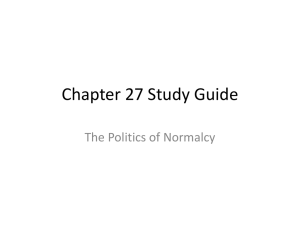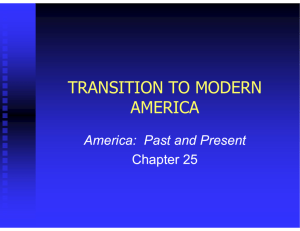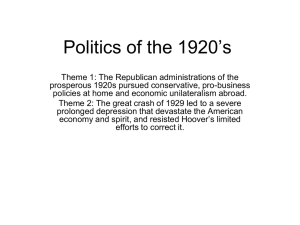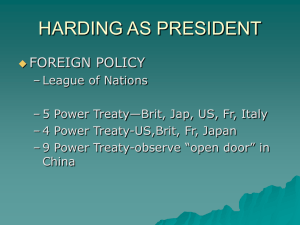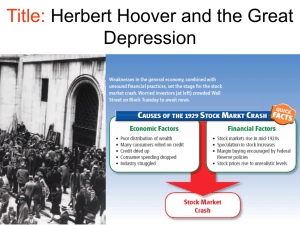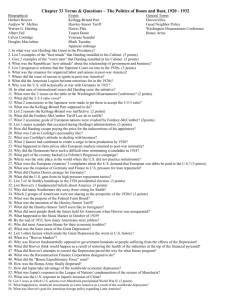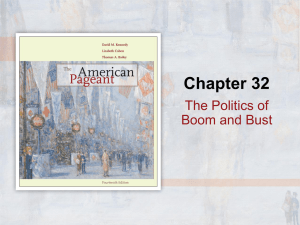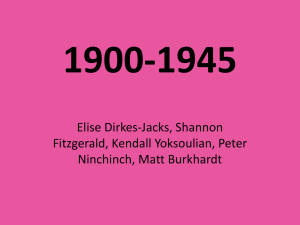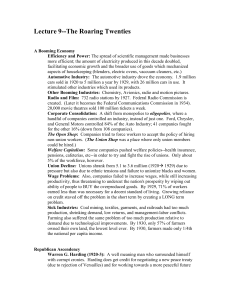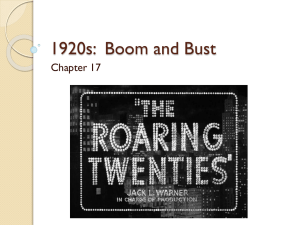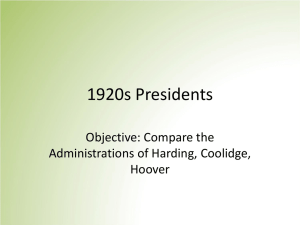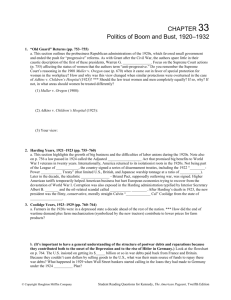The Modern Temper
advertisement
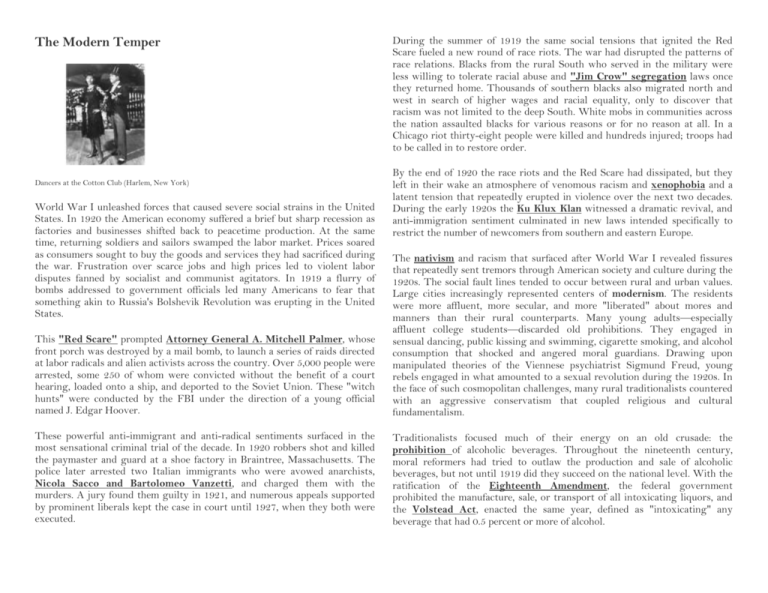
The Modern Temper Dancers at the Cotton Club (Harlem, New York) World War I unleashed forces that caused severe social strains in the United States. In 1920 the American economy suffered a brief but sharp recession as factories and businesses shifted back to peacetime production. At the same time, returning soldiers and sailors swamped the labor market. Prices soared as consumers sought to buy the goods and services they had sacrificed during the war. Frustration over scarce jobs and high prices led to violent labor disputes fanned by socialist and communist agitators. In 1919 a flurry of bombs addressed to government officials led many Americans to fear that something akin to Russia's Bolshevik Revolution was erupting in the United States. During the summer of 1919 the same social tensions that ignited the Red Scare fueled a new round of race riots. The war had disrupted the patterns of race relations. Blacks from the rural South who served in the military were less willing to tolerate racial abuse and "Jim Crow" segregation laws once they returned home. Thousands of southern blacks also migrated north and west in search of higher wages and racial equality, only to discover that racism was not limited to the deep South. White mobs in communities across the nation assaulted blacks for various reasons or for no reason at all. In a Chicago riot thirty-eight people were killed and hundreds injured; troops had to be called in to restore order. By the end of 1920 the race riots and the Red Scare had dissipated, but they left in their wake an atmosphere of venomous racism and xenophobia and a latent tension that repeatedly erupted in violence over the next two decades. During the early 1920s the Ku Klux Klan witnessed a dramatic revival, and anti-immigration sentiment culminated in new laws intended specifically to restrict the number of newcomers from southern and eastern Europe. This "Red Scare" prompted Attorney General A. Mitchell Palmer, whose front porch was destroyed by a mail bomb, to launch a series of raids directed at labor radicals and alien activists across the country. Over 5,000 people were arrested, some 250 of whom were convicted without the benefit of a court hearing, loaded onto a ship, and deported to the Soviet Union. These "witch hunts" were conducted by the FBI under the direction of a young official named J. Edgar Hoover. The nativism and racism that surfaced after World War I revealed fissures that repeatedly sent tremors through American society and culture during the 1920s. The social fault lines tended to occur between rural and urban values. Large cities increasingly represented centers of modernism. The residents were more affluent, more secular, and more "liberated" about mores and manners than their rural counterparts. Many young adults—especially affluent college students—discarded old prohibitions. They engaged in sensual dancing, public kissing and swimming, cigarette smoking, and alcohol consumption that shocked and angered moral guardians. Drawing upon manipulated theories of the Viennese psychiatrist Sigmund Freud, young rebels engaged in what amounted to a sexual revolution during the 1920s. In the face of such cosmopolitan challenges, many rural traditionalists countered with an aggressive conservatism that coupled religious and cultural fundamentalism. These powerful anti-immigrant and anti-radical sentiments surfaced in the most sensational criminal trial of the decade. In 1920 robbers shot and killed the paymaster and guard at a shoe factory in Braintree, Massachusetts. The police later arrested two Italian immigrants who were avowed anarchists, Nicola Sacco and Bartolomeo Vanzetti, and charged them with the murders. A jury found them guilty in 1921, and numerous appeals supported by prominent liberals kept the case in court until 1927, when they both were executed. Traditionalists focused much of their energy on an old crusade: the prohibition of alcoholic beverages. Throughout the nineteenth century, moral reformers had tried to outlaw the production and sale of alcoholic beverages, but not until 1919 did they succeed on the national level. With the ratification of the Eighteenth Amendment, the federal government prohibited the manufacture, sale, or transport of all intoxicating liquors, and the Volstead Act, enacted the same year, defined as "intoxicating" any beverage that had 0.5 percent or more of alcohol. The clash between rural and urban values reached a theatrical climax during the famous "monkey trial" in the town of Dayton, Tennessee, in 1925. A state law prohibiting the teaching of Charles Darwin's theory of evolution was challenged by a high-school biology teacher named John Scopes, and the resulting trial pitted the forces of fundamentalism against liberalism. The court ruled against Scopes, but the widely publicized trial helped generate a nationwide assault against fundamentalism that further eroded the foundations of biblical and social orthodoxy. Liberal Protestants and advocates of modern scientific methods heaped scorn upon fundamentalists, initiating a cultural civil war that persists today. -------------------------------------------------------Republican Resurgence and Decline time, Secretary of Commerce Herbert Hoover worked closely with business leaders to create benefits for workers so as to reduce the appeal of trade unions. He also established new government initiatives to help mediate disputes between labor and management and thereby avert strikes and boycotts. The Democrats, meanwhile, fragmented along sectional lines that reflected the cultural civil wars of the decade. The rural faction, rooted in the South and West, sustained a commitment to cultural populism. This meant support for Prohibition, fundamentalism, the Klan, and government support for farmers. The urban faction of the party, centered in the growing cities of the East and Midwest, depended for its support on immigrant groups that were largely Catholic or Jewish. They tended to oppose Prohibition and recoil from the Protestant orthodoxy of their rural counterparts. The split within the Democratic party turned into a chasm at the 1924 national convention in New York. Efforts to unify the divided party proved fruitless. Urban delegates dismissed the "rubes and hicks" from "the sticks" while populist spokesmen charged that metropolitan Democrats were "rooted in corruption, directed by greed and dominated by selfishness." A northern effort to pass a resolution condemning the Ku Klux Klan aroused bitter opposition from the southern delegates, and failed by one vote. Warren Harding (left) and Calvin Coolidge In the aftermath of World War I and the collapse of Woodrow Wilson's health and his presidency, the Republican party regained control of the White House and the Congress. President Warren G. Harding promised the nation a "return to normalcy." This meant abandoning the efforts of Wilson and Theodore Roosevelt to promote political reform and economic regulation. Instead, the Republicans would revive the pro-business orientation that had served the party so well during the Gilded Age. Harding's successors, Calvin Coolidge and Herbert Hoover, shared this philosophy. Coolidge, who assumed office in 1923 upon the death of Harding, proclaimed that the "business of America is business." To foster the growth of business, the Republicans emphasized reduced government spending, lower taxes, and higher tariffs. Secretary of the Treasury Andrew Mellon, a wealthy Pittsburgh banker and industrialist, slashed personal income and estate tax rates and sharply reduced federal government spending. Coolidge once remarked that if the federal government disappeared, few would notice and even fewer would regret it. At the same Progressives in both parties felt alienated by the conservative spirit of the times. In the 1924 election they rallied their support behind the third-party candidacy of Robert La Follette of Wisconsin, who headed a revived Progressive party. La Follette and the Progressives adopted a pro-labor and pro-farm platform that echoed the Populists: it called for federal ownership of railroads and utilities, higher taxes on the wealthy, the end of child labor, and conservation of natural resources. La Follette received the endorsement of the Socialist party and the American Federation of Labor, and he drew nearly 5 million votes, mostly from disaffected Democrats. Nevertheless, he still finished a distant third behind Coolidge and Davis. Four years later Herbert Hoover rode the wave of economic prosperity into the White House. In his acceptance speech he predicted the "final triumph over poverty," and in his inaugural address he declared that he "had no fears for the future of our country. It is bright with hope." Hoover embodied the principles of rugged individualism and equal opportunity embedded in the American experience. Although a staunch supporter of corporate interests and ardent defender of Prohibition, he was a more progressive thinker than either Harding or Coolidge. Hoover believed that capitalism had advanced beyond the initial stage of cut-throat competition and was entering a period of rational cooperation in marketing, wage policies, and product standardization. He also argued that it was in the best interests of corporate America for businesses to engage in voluntary acts of welfare capitalism, extending benefits to workers in order to eliminate the need for trade unions and to blunt the appeal of socialism. Hoover was by far the best qualified and most able of all the Republican presidents during the twenties, but he assumed office in 1929, the year in which the Great Bull Market collapsed and the nation began to spiral downward into the worst economic depression in its history. To be sure, Hoover did not cause the Great Depression, but he failed to recognize ominous warning signals. The Great Depression deepened quickly after October 1929 and spread across the country. In 1930 alone almost 1,300 banks closed their doors. During 1931 another 2,300 collapsed. Unemployment rose from 3 percent in 1929 to 25 percent in 1933, meaning that almost 13 million people found themselves jobless. Statistics hardly convey the human costs of the depression. Prolonged unemployment led people to lose their homes and farms. By the thousands, the displaced and dispossessed began to roam the streets and byways, looking for work, begging for money, and sleeping on benches or the ground. Suicides increased by 30 percent between 1929 and 1932, and marriage and birth rates plummeted. Those already living on the margin of society were especially hard hit: African Americans, Mexican-Americans, and recent immigrants. Yet for all of the depression's devastating effects, most Americans refused to succumb to fatalism. They persevered, displaying a gritty tenacity that was both inspiring and ennobling. They refused to let hard times break their spirits or corrupt their dignity. As Ma Joad declares in John Steinbeck's The Grapes of Wrath (1936), "They ain't gonna wipe us out. Why, we're the people—we go on."
